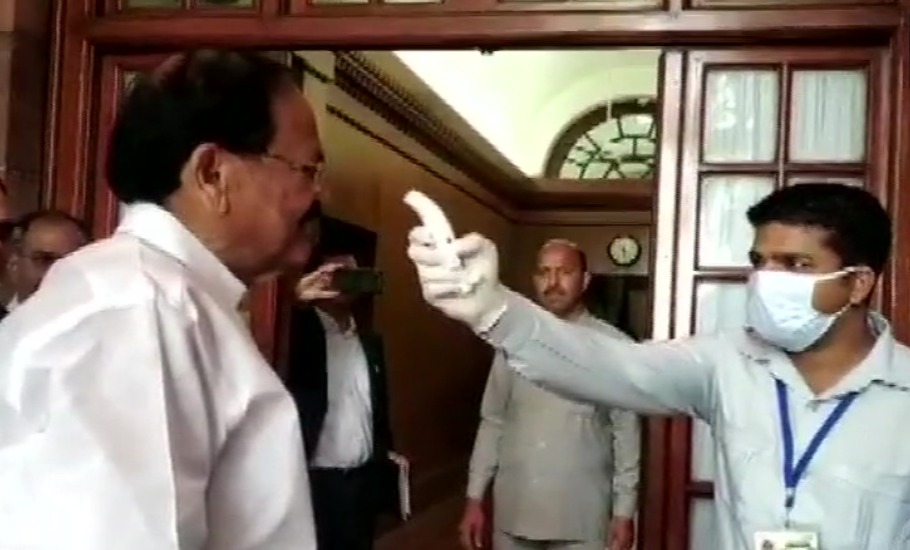
COVID-19: Masks debut in RS; MPs demand curtailed Budget session
Members of Parliament from the opposition parties on Wednesday (March 18) demanded curtailment of the ongoing Budget session in the Rajya Sabha in view of the fast-spreading coronavirus outbreak in the country.

Members of Parliament from the opposition parties on Wednesday (March 18) demanded curtailment of the ongoing Budget session in the Rajya Sabha in view of the fast-spreading coronavirus outbreak in the country. However, the Chairman said any decision on it will have to be taken by the government in consultation with stakeholders.
Trinamool Congress (TMC) members, who came to the Upper House wearing protective face masks, were asked by Chairman M Venkaiah Naidu to remove them immediately. He said rules do not allow members to sport masks in the House and “it will be difficult to conduct” proceedings if the chair was defied.
But, when senior Congress leader P Chidambaram urged Naidu to allow MPs to decide on using protective gear depending on their perception of vulnerability, the chair agreed.
Opposition MPs suggested the Budget session be curtailed to practice social distancing being advocated by the government to limit spread of COVID-19. The session is
scheduled to end on April 3.
Related news: India’s coronavirus cases spike to 147; Maharashtra worst-hit with 47 patients
While MV Rajeev Gowda of the Congress urged the government to either curtail or postpone the Budget session, his senior party colleague Anand Sharma said the government was preaching social distancing but is not following it in Parliament.
Gowda said Rajya Sabha had amongst it many senior citizens as MPs who are extremely vulnerable to coronavirus, to which Naidu responded saying any decision on curtailment of the session will have to be taken by the government in consultation with other stakeholders.
Minority Affairs Minister Mukhtar Abbas Naqvi, however, said Parliament should not show panic by adjourning early and instead show the fighting spirit.
Responding to Naqvi’s remark, Naidu said the Parliament house complex has been sanitised and temperature checking is being done at the gates before allowing anyone inside.
Also, hand sanitisers have been kept at various points, he said. Two sanitisers were also placed inside the House as well. Immediately after reading out obituary reference to
passing away of former member Puttappa Patil, Naidu said no masks are allowed in the House and asked TMC members to go out to remove them.
Related news: COVID-19: Southern Railways cancels 10 trains due to low occupancy
At this point, Chidambaram rose to state that the issue should be left to the judgement of individual members. Any member feeling vulnerable should be allowed to wear face masks.
Naidu accepted his argument but said the House was setting a precedent. If members feel vulnerable, they can make preventive arrangements, he said, adding, “I leave it to the members.”
He said MPs can make suggestions on further strengthening measures in the Parliament House complex to check spread of coronavirus.
Meanwhile, Rajya Sabha Congress MP Ripun Bora highlighted problems being faced by people due to shortage and high prices of sanitisers and masks amid outbreak of coronavirus.
Raising the issue during the Zero Hour in the House, he said the government has asked people to take precautionary steps like cleaning of hands.
Bora said there was shortage of sanitisers, soaps and masks not only in metro cities, but also in rural areas of the country and these items were being sold at exorbitant prices.
Related news: 10 points: India reports third coronavirus death, pvt labs to begin testing
The Congress member urged the Ministry of Health and Family Welfare to monitor the supply, and ensure their availability and proper prices so that there is no panic among the public.
Making a special mention on the coronavirus issue, Sanjay Singh (AAP) stressed on increasing number of testing centres, and follow the model adopted by South Korea in this regard.
He also made a case for increasing the number of quarantine centres as the country should be prepared for a “medical emergency”.
(With inputs from agencies)

